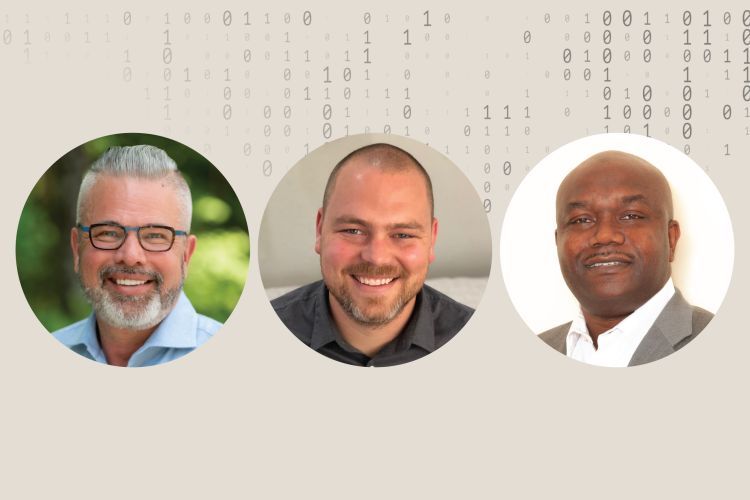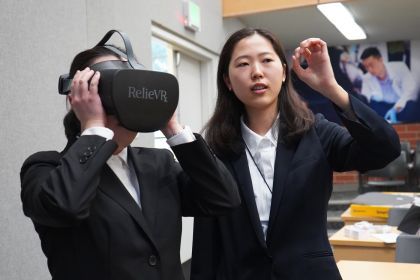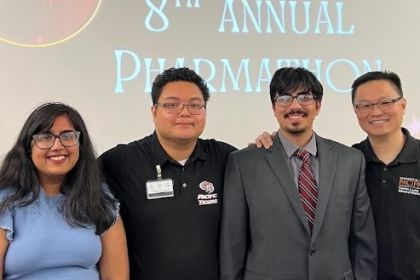Breadcrumb
Harnessing the power of AI
Personalized medicine isn’t on the horizon; it’s here, and it’s being driven by artificial intelligence. Our alumni are on the forefront, forging new paths in this rapidly evolving space. These entrepreneurs are leveraging AI as a tool to transform how pharmacists conduct research and deliver patient-centered care.

Paul Ambrose ’92, PharmD, FIDSApRxcision The first infectious disease AI platform that continuously monitors patient data and equips clinicians with real-time insights to make informed, life-saving decisions. | Tim Linnet ’10, PharmDPharmacycompounding.ai AI-driven workflows tailored for compounding pharmacies, offering real-time calculations, compliance support and accuracy checks for safe and precise compounding. | Ome Ogbru ’95, PharmDAINGENS MACg is the company’s user-friendly, AI-powered platform that streamlines scientific writing by drawing from peer-reviewed literature to create engaging scientific content. |
What are you excited to share about the work your company is doing?
Ambrose: pRxcision started with a bold question: What if we could give every clinician the power to make the right antibiotic choice — instantly? Our mission is to reduce clinician burnout, restore clarityto complexity and deliver better outcomes for patients who can’t afford delay.
Linnet: As a pharmacy director, I experienced the pressure of sterile compounding inspections. I started building these AI products to satisfy my own needs. Seeing the benefits, such as dramatic time savings, accuracy and stress relief, led me to start Pharmacycompounding.ai to help other pharmacists. In the last quarter alone, we’ve experienced a tenfold increase in usage.
Ogbru: As a clinical pharmacist, I saw how long it took to find the right information. AINGENS was born out of a need to simplify research. With MACg, users can access over 37 million citations, in seconds, to generate dynamic content.
How have you seen AI transform patient care?
Ambrose: AI identified a patient with multidrug-resistant pneumonia. Within minutes, the care team shifted the therapy and the patient survived the infection. That’s not theoretical; that’s what happens when the right information reaches the right hands in real time.
Linnet: AI was used to confirm a critical calculation for a patient in heart failure who needed to start medication right away. The calculation was performed instantly and accurately. This helped defuse the stress of the situation and get the drug to the patient more quickly.
“AI does not replace the clinician’s view from the foot of the hospital bed. That moment — human, holistic, full of context — will always matter most. The best AI honors that perspective and makes it stronger.”
– Paul Ambrose ’92, PharmD, FIDSA
How has your pharmacy background been an asset?
Ambrose: My background in clinical pharmacy is more than relevant, it’s the engine. I know what it means to stand at a patient’s bedside — to weigh options when time is short and stakes are high. I also understand the transformative power of data when it is distilled, timely and relevant.
Ogbru: It gives me a deep understanding of the health care system, patient-care challenges and practical issues pharmacists face. These insights are invaluable when designing advanced, customized AI systems that integrate seamlessly into pharmacy workflows.
What exciting opportunities does AI present for the field of pharmacy?
Ambrose: The future of pharmacy will be powered by intelligence — human and artificial. We can now tailor decisions in real time, detect safety risks before they escalate and help clinicians make sense of massive, shifting data. AI will never replace the human insight required to weigh risk, explain complexity or advocate for a patient. But it can make pharmacists more powerful as trusted clinical decision-makers. For decades, pharmacists have been the stewards of safe and effective medication use. Now, we can become architects of data-driven care.
Linnet: Every day, I see pharmacists complete work in minutes that would have taken hours. We should embrace AI as a continually evolving tool that enhances our ability to deliver better patient care, as well as alleviate stress and workload.






